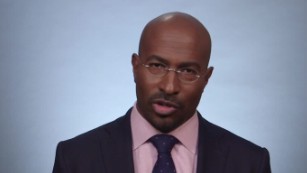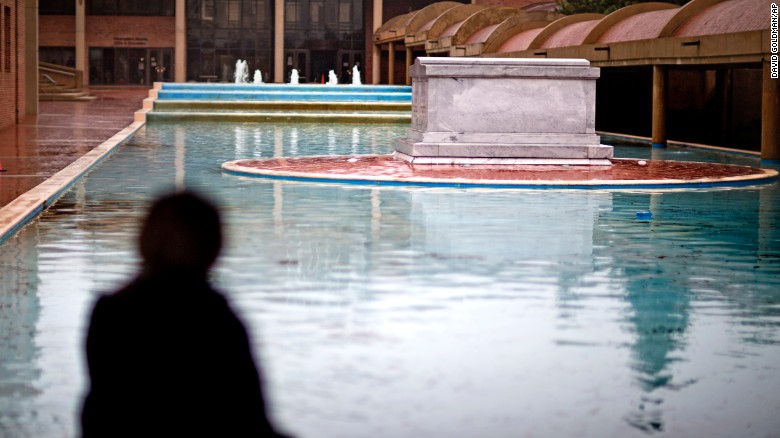Looking for hope in Trump's America at MLK's grave site
An Irish woman with wind whipping through her blonde hair walked down a deserted Atlanta street in search of inspiration.
She stopped at her destination: the white marble crypt of the Rev. Martin Luther King Jr. Sunlight glittered in the water of the reflecting pool surrounding it as she stared solemnly at King's resting place. His baritone voice rang from a loudspeaker nearby, the words of his "I've Been to the Mountaintop" speech echoing across the grounds. An American flag fluttered overhead.
Marian Purcell tried to reassure herself that the America she admired while growing up on an island once engulfed by sectarian violence still existed after the election of Donald Trump.
"I just kind of wanted to feel that things would be OK," said Purcell, who was visiting the site with her husband Patrick. "Trump is a misogynist, a racist -- he doesn't have any moral values I care for. I kind of wanted to go somewhere to be reminded that the moral values that we should stand for will eventually win."
While millions of Americans spent this week wondering how Trump's election might change their country, some people living abroad said it has already changed how they see America.
The country's allies were stunned. Some worried Trump's election would unleash waves of intolerance, that an America under Trump would no longer champion human rights, or that Washington would abandon allies it has protected since World War II. Many are concerned that the America they know -- a refuge of religious and racial tolerance embodied by King -- is becoming something else.
Some of those fears could be seen in the almost panicked tone of news coverage abroad. Some could be heard in the anxious conversations of tourists who made a pilgrimage to King's crypt after the election.
The tourist season is over, and the grounds of the King Center were largely empty. But many who were there saw King's resting place as a sacred space that evokes another America. They wrestled with this question: How does a country venerate both a King and a Trump?
"I'm very confused," said Brianna Martelozzo, who came to King's crypt with her husband, Giancarlo, a Brazilian painter. "I feel a little sadness being here today."

Van Jones discusses 'whitelash' comments
They decided to stop in Atlanta after flying from San Diego to Florida. Together, they looked like Bohemian artists: sunshades, nose-rings and, for Giancarlo, a scruffy black beard.
He said he doesn't think people abroad will look up to Americans as they once did.
"No," he said, scratching his beard. "They will look at America like it's a joke. They will be more scared of this country."
Some of their friends warned Giancarlo that America would no longer welcome him.
"She is more scared than me," he said, motioning to Brianna, her brow furrowed. "I don't care about religion, race, sexual options or stuff like that. I'm from Brazil, but I didn't choose to be from Brazil. I'm a global citizen. If you are good, I respect you."
Trump's election was also mystifying to a Canadian trio who had journeyed here. One was a stylishly dressed man sporting a black leather jacket and shaved head. He only gave his name as Maurice.
"We love you as neighbors, but there is a whole part of you that we don't understand, and I don't know if we ever will," he said, laughing.
Maurice hails from Toronto, which he proudly calls the most international city in the world. At least 140 languages and dialects are spoken there.
"We all live in a global village, and we need to think more progressively," he said, standing near a mural of King at the 1963 March on Washington. "Trump's rhetoric and policy are going to dial back the clock, and we should be moving forward. America has traditionally been a leader, but this is troubling."
'America is stronger than Trump'
It may be troubling, but it's not really surprising to Patrick Purcell, Marian's husband.
The Purcells live in the United Kingdom and voted against what they called the "horror" of Brexit, the recent referendum by their country's citizens to leave the European Union.
Trump's election was fueled by the same fear that led to the Brexit vote, said Patrick Purcell.
"He's tapped into this sense that there is this new economic order that is leaving people behind," he said.
Purcell is a student of American politics. He's visited four presidential libraries during his many travels to the United States since 1964. He even went to a recent Trump rally in Florida out of curiosity.
"He was extraordinary," Purcell said. "He's very funny, charismatic, nasty, racist -- all at the same time. It was very uncomfortable at times."
Purcell said he is worried about Trump's temperament. He told a story about a British prime minister who was once asked what the hardest part of his job was. His reply: "Events, dear boy, events."
He wonders: How will Trump handle unforeseen events?
"George Bush said he would be a domestic president and then 9/11 happened nine months into his presidency," Purcell said. "You wonder how [Trump] is going to react."
Trump's election won't irrevocably change how people abroad see America, Purcell said.
"This place is a beacon of hope," he said. "You can get ahead if you work hard. It stands for freedom, freedom of the press, a fair legal system. America stands for fairness.
"America is stronger than Trump."
His wife disagreed.
Asked if America is still an inspiration abroad, she said: "I'm not sure it is anymore."
"I think the perception is that, with all due respect, a lot of Americans are naive. They don't actually see the bigger picture in a lot of ways."
The picture should become clearer over the next four years. The motto of Trump's campaign was "Make America Great Again." And the nation's motto is E pluribus unum: "Out of many, one."
The world will soon find out if those two mottoes can coexist.
News Courtesy: www.cnn.com











